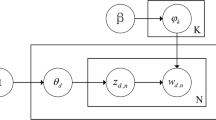Abstract
Despite the development and the wide use of E-Learning, developing an adaptive personalised E-Learning system tailored to the needs of individual learners remains a challenge. In an early work, the authors proposed APELS that extracts freely available resources on the web using an ontology to model the leaning topics and optimise the information extraction process. APELS takes into consideration the leaner’s needs and background. In this paper, we developed an approach to evaluate the topics’ content extracted previously by APELS against a set of learning outcomes as defined by standard curricula. Our validation approach is based on finding patterns in part of speech and grammatical dependencies using the Stanford English Parser. As a case study, we use the computer science field with the IEEE/ACM Computing curriculum as the standard curriculum.
Access this chapter
Tax calculation will be finalised at checkout
Purchases are for personal use only
Similar content being viewed by others
References
Aeiad, E., Meziane, F.: An adaptable and personalised e-learning system based on free web resources. In: Biemann, C., Handschuh, S., Freitas, A., Meziane, F., Métais, E. (eds.) NLDB 2015. LNCS, vol. 9103, pp. 293–299. Springer, Heidelberg (2015)
Bloom, B.S., Engelhart, M.D., Furst, E.J., Hill, W.H., Krathwohl, D.R.: Taxonomy of Educational Objectives: Handbook 1, The Cognitive Domain. Allyn & Bacon, Boston (1956)
Bracewell, D.B., Ren, F., Kuriowa, S.: Multilingual single document keyword extraction for information retrieval. In: Proceedings of the International Conference on Natural Language Processing and Knowledge Engineering, pp. 517–522. IEEE (2005)
Brill, E.: A simple rule-based part of speech tagger. In: Proceedings of the 3rd Conference on Applied Natural Language Processing, pp. 152–155. ACL, Stroudsburg (1992)
Cohen, J.D.: Highlights: language- and domain-independent automatic indexing terms for abstracting. J. Assoc. Inf. Sci. Technol. 46(3), 162–174 (1995)
De Marneffe, M.-C., Manning, C.D.: Stanford typed dependencies manual. Technical report, Stanford University (2008)
ECTS Users’ Guide. Computer science curricula (2005). http://ec.europa.eu/education/programmes/socrates/ects/doc/guide_en.pdf
Hepple, M.: Independence, commitment: assumptions for rapid training and execution of rule-based pos taggers. In: Proceedings of the 38th Annual Meeting on Association for Computational Linguistics, ACL 2000, pp. 278–277. Association for Computational Linguistics, Stroudsburg (2000)
Hulth, A.: Improved automatic keyword extraction given more linguistic knowledge. In: Proceedings of the 2003 Conference on Empirical Methods in NLP, pp. 216–223 (2003)
Krulwich, B., Burkey, C.: Learning user information interests through extraction of semantically significant phrases. In: Proceedings of the AAAI Spring Symposium on Machine Learning in Information Access, pp. 100–112 (1996)
Porter, M.F.: An algorithm for suffix stripping. Program 14(3), 130–137 (1980)
ACM/IEEE Societies. Computer science curricula (2013). http://www.acm.org/education/CS2013-final-report.pdf
Uzun, Y.: Keyword extraction using naive bayes. Technical report, Bilkent University, Computer Science Dept., Turkey (2005)
Wentling, T.L., Waight, C., Strazzo, D., File, J., La Fleur, J., Kanfer, A.: The future of e-learning: A corporate and an academic perspective (2000). http://learning.ncsa.uiuc.edu/papers/elearnfut.pdf
Author information
Authors and Affiliations
Corresponding author
Editor information
Editors and Affiliations
Rights and permissions
Copyright information
© 2016 Springer International Publishing Switzerland
About this paper
Cite this paper
Aeiad, E., Meziane, F. (2016). Validating Learning Outcomes of an E-Learning System Using NLP. In: Métais, E., Meziane, F., Saraee, M., Sugumaran, V., Vadera, S. (eds) Natural Language Processing and Information Systems. NLDB 2016. Lecture Notes in Computer Science(), vol 9612. Springer, Cham. https://doi.org/10.1007/978-3-319-41754-7_27
Download citation
DOI: https://doi.org/10.1007/978-3-319-41754-7_27
Published:
Publisher Name: Springer, Cham
Print ISBN: 978-3-319-41753-0
Online ISBN: 978-3-319-41754-7
eBook Packages: Computer ScienceComputer Science (R0)




